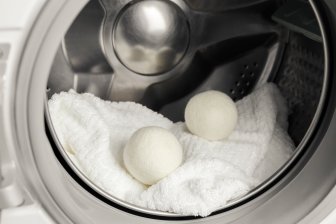’Tis the time for turkey and gravy and cookies and cakes. And after waiting all year to indulge in some of your favourite holiday foods, it’s understandable that it would be tough to hold back when it comes to chowing down.

But eating those fancy feasts can really wreak havoc on your digestive system, leaving you feeling like jolly old Saint Nicholas with a belly full of jelly.
So what can you do to beat belly bloat?
While it may be your first thought to cut out certain “bad” foods, don’t, says registered dietician Andrea D’Ambrosio of Dietetic Direction. This promotes a poor relationship with food and polarizes consumption in extremes.
Instead, listen to your body, know your limits and practice portion control if certain foods tend to impact you — what may trigger bloating for one person may not be a trigger for discomfort in another.
Bloating, D’Ambrosio explains, happens when our digestive system has trouble breaking down foods. As a result, excess gases are generated by bacteria in the lower intestines, which can cause a swollen or distended belly as well as pain and the feeling of being “stuffed.”
That’s not to say, however, there aren’t common foods we tend to eat around the holidays, as well as certain changes in our eating habits, that are known to typically cause bloating.
READ MORE: 5 swaps for your favourite unhealthy holiday meals
1. Eating large meals and overeating
- Buzz kill? Gen Z less interested in coffee than older Canadians, survey shows
- ‘She gets to be 10’: Ontario child’s heart donated to girl the same age
- Canada updating sperm donor screening criteria for men who have sex with men
- Bird flu risk to humans an ‘enormous concern,’ WHO says. Here’s what to know
“Large portions cause our digestive system to work harder, which can lead to bloating,” D’Ambrosio says. “If you are prone to bloating, try smaller meals to see if this leaves you feeling less bloating and more comfortable.”
Keep in mind, she adds, that fullness signals can take up to 20 minutes to reach your brain. After that, appetite tends to decrease so wait before asking for a second plate.
If you still feel bloated after eating smaller meals, it’s a good idea to speak with your doctor or a dietitian who specializes in digestion.
2. Fizzy beverages
Swallowing air when we eat or drink can allow excess gas to enter the digestive system and can lead to bloat. This happens when we consume fizzy drinks like beer, soda and champagne.
“These drinks contain carbon dioxide bubbles, which release gas from the liquid when it reaches our stomach,” D’Ambrosio explains. “Depending on the amount you drink, the excess carbon dioxide may accumulate, leading to bloating or burping.”
Liquid calories are also more calorically dense, she adds, which can lead to feelings of being overstuffed.
If carbonation is a bloating trigger, sip on non-carbonated beverages or cocktails. Also, avoid drinking with a straw and eating quickly or while talking, which increases the amount of air swallowed.
And after your meal, try breathing exercises or take a walk, as it can help manage discomfort.
READ MORE: You can stick to a keto diet during the holidays. But is it worth it?
3. Fatty foods
Foods around the holidays tend to be richer, deep-fried or higher in cheese and creams, making them common culprits for belly bloat.
According to D’Ambrosio, fatty foods slow digestion and stomach emptying.
Around the holidays, be mindful of how many fatty foods you’re consuming and choose alternative foods that you know are fresh or lower in fat, she says.
4. Some vegetables
For those suffering from irritable bowel syndrome (IBS) and inflammatory bowel disease (IBD), certain vegetables can upset the stomach. If that’s the case, they may be on the low-FODMAP (fermentable oligosaccharides, disaccharides, monosaccharides and polyols) diet.
According to the American Chemical Society, a low FODMAP diet includes taking away foods that contain FODMAP compounds and then systemically adding them back into a person’s diet in order to determine specific triggers.
FODMAPs, D’Ambrosio explains, are a collection of poorly digested sugars, known as fructans, which can be found in some vegetables. They can cause the bowel to distend by drawing more fluid from the food, which generates more gas by gut bacteria fermentation.
If you’re prone to bloating and follow the FODMAP diet, which limits the intake of these sugars, be cautious on portions of certain foods like brussel sprouts, cabbage, broccoli, cauliflower, onions and garlic.
The American Chemical Society also lists apples, wheat and corn as foods that are highest in FODMAP compounds.
5. Certain fibre-rich foods
Consuming more fibre-rich foods than you’re used to can leave you feeling bloated or gassy, D’Ambrosio says. That’s because fibre is the indigestible component in foods.
Fibre travels through your digestive system and picks up cholesterol, slowing down the release of blood sugar and leaves you feeling full for longer.
“Fibre works your digestive system differently because it requires diverse gut bacteria to break down the sugar,” D’Ambrosio says. “For those with IBS or following the low-FODMAP diet, beans and lentils are high-fibre and contain oligosaccharides, which is a hard-to-digest sugar.”
Most people need more fibre in their diets, D’Ambrosio adds, so if your goal is to increase you dietary fibre, try to do so gradually and increase your water intake at the same time. This can help in boosting your helpful bacteria.
Other tips
On the days you know you’ll be feasting, make sure you have a balanced breakfast or lunch complete with fibre and protein, as this will help prevent overeating, D’Ambrosio says.
But if bloating does happen, drinking water can be helpful, as can taking a brisk walk.
Peppermint or ginger teas may also help soothe an uncomfortable stomach.
And since constipation can also worsen symptoms of bloating, D’Ambrosio says to boost your intake of soluble fibre with chia seeds, as it can help in moving bowels.












Comments